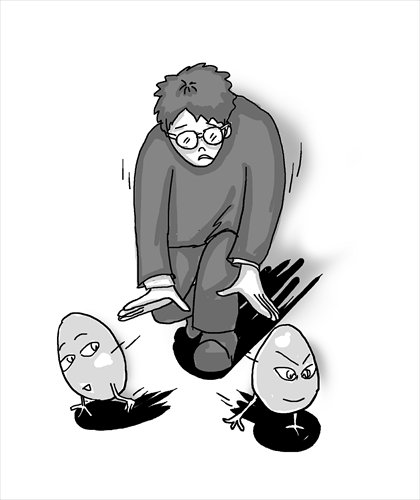HOME >> BUSINESS
High failure rates plague China’s M&A sector
By Liu Tian Source:Global Times Published: 2015-3-22 17:53:01
Acquiring companies should focus on deals’ fundamentals

Illustration: Lu Ting/GT
China's mergers and acquisitions (M&A) market is off to a strong start this year. Recent figures from Reuters show disclosed deals totaling $63.7 billion so far, up 48 percent from the on-year period and setting a new record sum the first quarter.
Looking back, 2013 now seems like a watershed moment for China's M&A market, with disclosed deals totaling about $43 billion that year. These results were topped the following year, when China's M&A market recorded 1,929 deals involving $120 billion, up 56.6 percent in volume terms and 27.1 percent in value terms, according to media reports.
The rapid growth of China's M&A market is largely the product of three factors: supportive government policies, recognition among enterprises of the need to transform and upgrade, and increased availability of venture capital and private equity funds thanks to a prolonged halt on IPOs. Authorities issued a slew of administrative measures in 2014 which relaxed and simplified M&A regulations. Over the years ahead, such measures will certainly continue to boost activity in the market.
Businesses enter into the M&A market for many different reasons. Some buyers want to upgrade their technologies or expand their profits by acquiring smaller companies in emerging industries. For example, Wanda group spent $315 million at the end of 2014 to purchase a 68.7-percent stake in 99bill.com, an online payment service provider. Others are pursuing industrial integration by merging with upstream and downstream enterprises, while still others want to overcome weaknesses in their own operations through tie-ups with more successful peers. For instance, Tencent has invested in 58.com, jd.com and dianping.com in order to make up for deficiencies in its e-commerce operations.
Whatever the motivation, there are several common features behind successful M&A deals. Both sides of the deal should complement each other in their strategic value and strategic arrangement. This should lead to smooth integration between the acquirer and the company being acquired. Also essential are reasonable valuations and adequate financing channels.
However, a majority of M&A deals usually end up failing. Statistics shows that there were 6,967 declared deals in China in 2014, but only 2,574 were actually completed, according to CVSource - a financial data tool developed by China Venture Group.
There are many different reasons for the failure of these deals. But generally speaking, an M&A with a focus on superposition of income and profit will ultimately end up in failure.
In other words, a "pure additive" between the acquirer and acquiree is unsustainable. In addition, ill-matched corporate cultures, over-valuation of the acquired enterprise, and excessive grooming - in contradiction to the facts - of the enterprise to be acquired will also lead an M&A to failure. Only a deliberate M&A deal based on the industry layout and strategic planning can give the acquirer a synergistic and multiplier effect that boosts development.
In China, enterprises have not fully realized and understood the risks of M&A, since they just entered this sector. This is also true for listed companies, though they are always regarded as more rational due to their wise business decisions and good corporate governance.
Facts show that some listed companies have blindly carried out many cross-industry M&A deals in 2014 with a preference for those in hotly speculated industries, but without detailed investigation and long-term planning. The potential risks will be exposed this year and next, leading to impossible earnings estimates.
Some listed companies even make use of the concept of M&A to speculate, telling a beautiful story to investors to give its share price a boost, since the capital market usually responds to M&A news by pushing a stock price up to its limit.
Overall, one can't ignore the high failure rate of M&A deals in China, but the field still has a lot of potential. Chinese investors should invest rationally and not blindly boost stock prices whenever M&A news breaks.
The author is a reporter with the Global Times. bizopinion@globaltimes.com.cn
Posted in: Comments